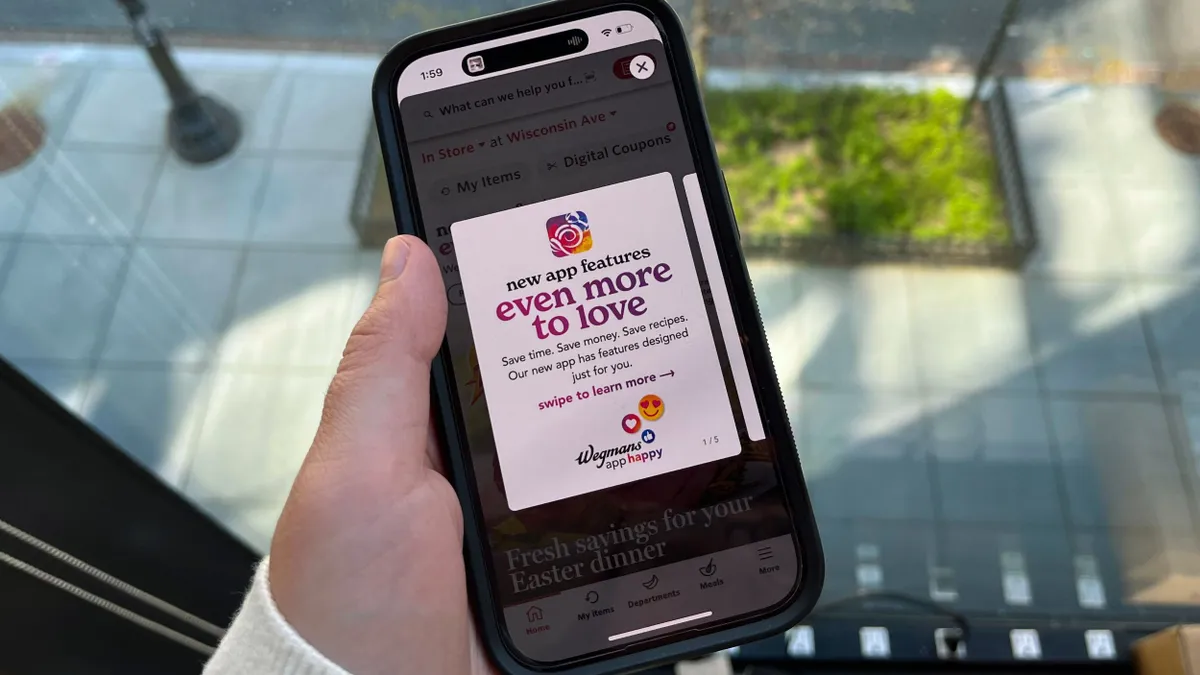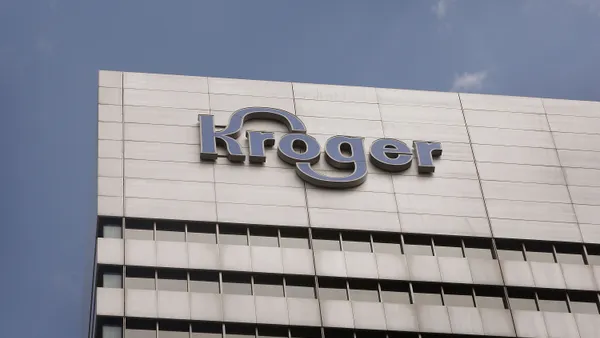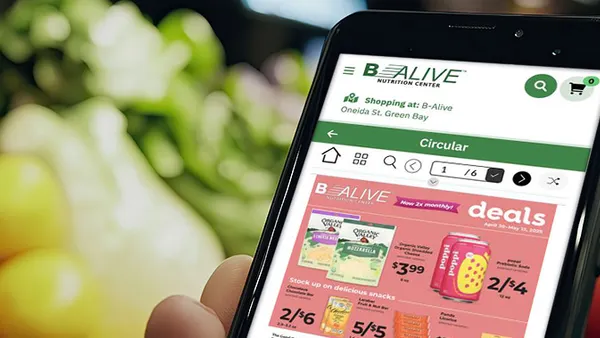If Amazon is known as "The Everything Store," then Choice Market could just as easily be known as "The Every-Format Store."
That's because it's dabbling in a little bit of everything as it tries to reach modern shoppers. It has all the hallmarks of a convenience store — the 2,500-square-foot size, the racks of candy and snacks — combined with the fresh produce and household goods of a grocery store. Choice Market does 60% of its business in packaged and made-to-order meals, all of which are prepared in an on-site kitchen, and offers order pickup and delivery across its assortment.
It's also getting into vending machines. And checkout-free technology. And it has a second-generation c-store design set to debut later this year.
"We're in every channel," said founder and CEO Mike Fogarty in a recent interview with Grocery Dive. "There are channels that we didn't even think of in the original business plan coming to our doorstep."
While grocery chains across the country are adding online ordering, in-store restaurants and prepared meals in an effort to serve consumers where, when and how they want to be served, Choice Market has made omni-retailing the core of its business model. Although it has just one Denver store now, it has ambitions to become a national chain, and the success or failure of it along with other similar up-and-coming retailers promises to offer insights on small format strategy and convenience.
First: The store itself. Choice Market is located in Denver's Central Business District, a neighborhood dense with office workers and apartment dwellers. The store carries around 3,000 SKUs ranging from paper towels to acai bowls. It offers products from around 100 local suppliers and specializes in all-natural products. All of its produce is organic, but it also stocks name brands in categories like candy and beverages.
Choice's top selling grocery item is organic bananas, followed by 20-ounce bottles of Coca-Cola.
"We have avocado mayo, but we also have Hellmann's," said Fogarty.
Choice Market's made-to-order meal service, which includes bowls, wraps, smoothies and salads drives regular lunch and breakfast traffic to the store. It's also an e-commerce driver, with 30% of the store's sales coming online. The small store has latched onto the restaurant delivery wave, with several companies including Uber Eats and Postmates handling last-mile fulfillment. Customers often order around mealtime, Fogarty said, then add groceries like ice cream, chips and milk while they're at it.
Choice Market recently overhauled its menu with the help of Erik Oberholtzer, founder of the California restaurant chain Tender Greens, which has 31 locations throughout California and in New York City and Boston. According to Fogarty, this infused more locally sourced ingredients into the mix, creating dishes like the tri-color quinoa bowl and harvest salad.
"We think that scratch kitchen is where the value really lies," he said. "Local, fresh ingredients have always been core to our business, but we're basically doubling down."
Before founding Choice Market, Fogarty worked in the CPG industry managing plastic packaging for WhiteWave Foods. There, he tracked evolving consumer demand and saw innovative products get developed and then passed over by major chains. Legacy operators, he said, weren't being forward-thinking, so he decided to give it a go himself. He sold his house, took out a large loan and, as he tells it, "went all in." Choice Market opened its doors in 2017.
Vending machines and frictionless checkout
Fogarty grew up near Philadelphia and cited Wawa as a major influence on his store's model. He also pointed to the small markets he frequented daily during several months living in Barcelona.
"We felt there was a model somewhere in between c-store and grocery store," Fogarty said.
This hybrid approach has been adopted by other upscale urban chains, including Portland-based Green Zebra Grocery and Chicago's Foxtrot Market, both of which are growing rapidly (Choice Market and Foxtrot Market are both funded by M3 Ventures). And they reflect a shift towards quick-trip shopping along with the steady movement of millennials into cities.
But Fogarty wants to reach shoppers in the suburbs and elsewhere with two new formats. The first of these is a high-tech vending machine called the Choice Mini-Mart. Customers swipe their credit card (Choice will soon have an app through which customers can also pay), open the vending door and then select from a selection of snacks, beverages and fresh meals ranging from $3 up to $11. A sensor system tracks which items customers select and charges them once they're done.
The first two Mini-Marts are now operating at Denver's Mission Ballroom, a new concert venue. A third will open this fall at the new Denver Housing Authority building, which will also be the site of Choice Market's second store. From here, Fogarty envisions Mini-Marts appearing in office buildings, airports and other institutions along with neighborhoods with few fresh food options.
By the end of this year, Fogarty plans to open a new format in the Denver suburbs that leans more towards c-store than grocery store. It'll have fueling stations along with electric-vehicle charging, scooter and bike share stations and a solar canopy outside, while a collection of grocery and convenience products will greet customers inside. It will also feature frictionless checkout similar to Amazon Go, Fogarty said.
"You can charge your Tesla, do some light grocery shopping, hang out on WiFi and grab a six pack of beer," he said.
The new c-store model, with locations ranging from 4,000 to 6,000 square feet, along with the urban mini markets and vending machines altogether comprise a multi-modal approach that reflect modern demands for convenience and high-quality food, Fogarty said.
With $1.5 million in initial funding and a Series A round set to wrap up soon, Fogarty wants to grow Choice Market locally, with two additional c-stores in the first half of 2020, then expand to two new markets in the next three years. Within five years, he hopes to have around 30 stores and be in several metro markets. If all is going well at that point, he said, the company may explore a sale or even an IPO.
Competing across channels makes Choice Market unique. It also means the store has a lot of competition, with c-stores, grocers and restaurants all stepping up their technology and their food assortment. Amazon Go, which now counts more than a dozen locations including three in San Francisco — where Fogarty would like to locate next — is also a competitor. Asked if the small, tech-focused store's growth concerns him, Fogarty quickly said, "not even the slightest."
"We're a fundamentally different business model," he noted. "We're omnichannel and they're just focused on the one channel. We're a food-focused brand that's leveraging technology whereas Go is the reverse. They're a tech company selling food."














